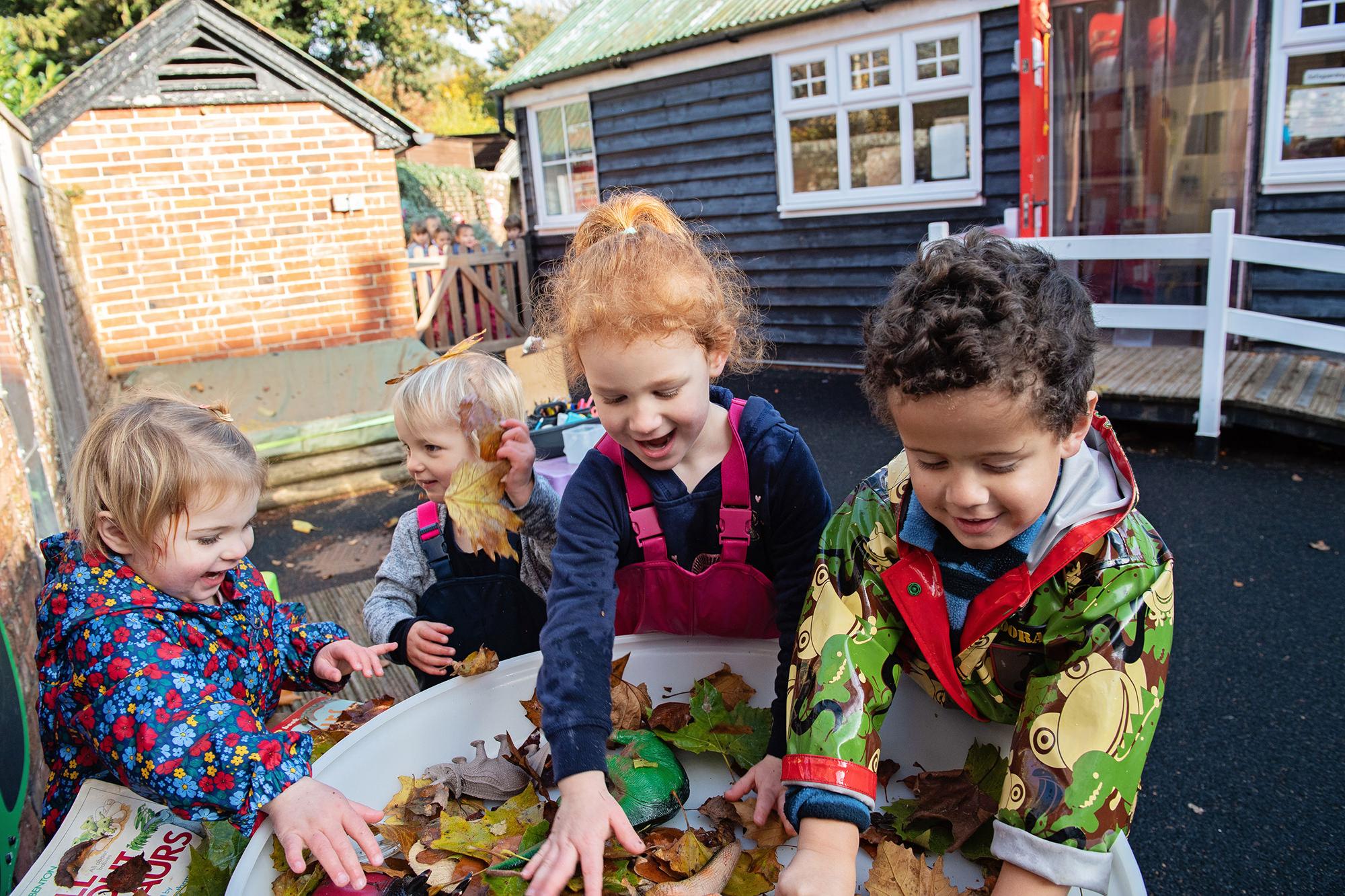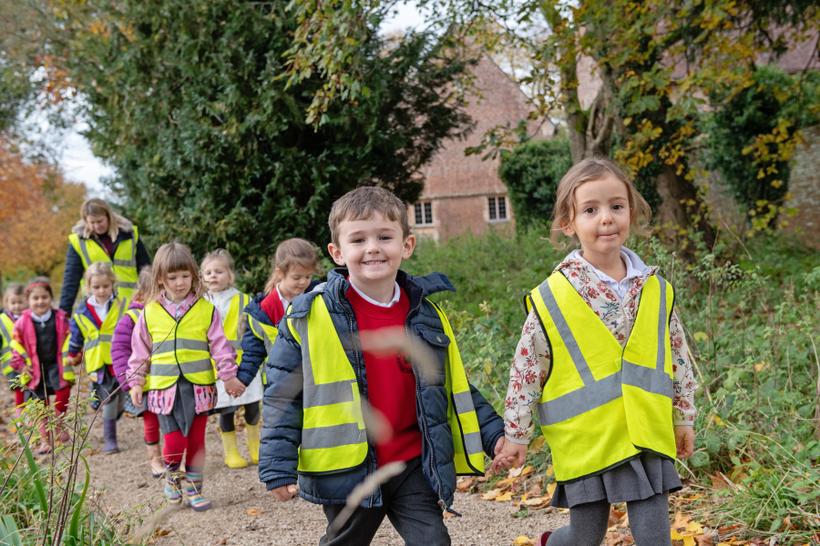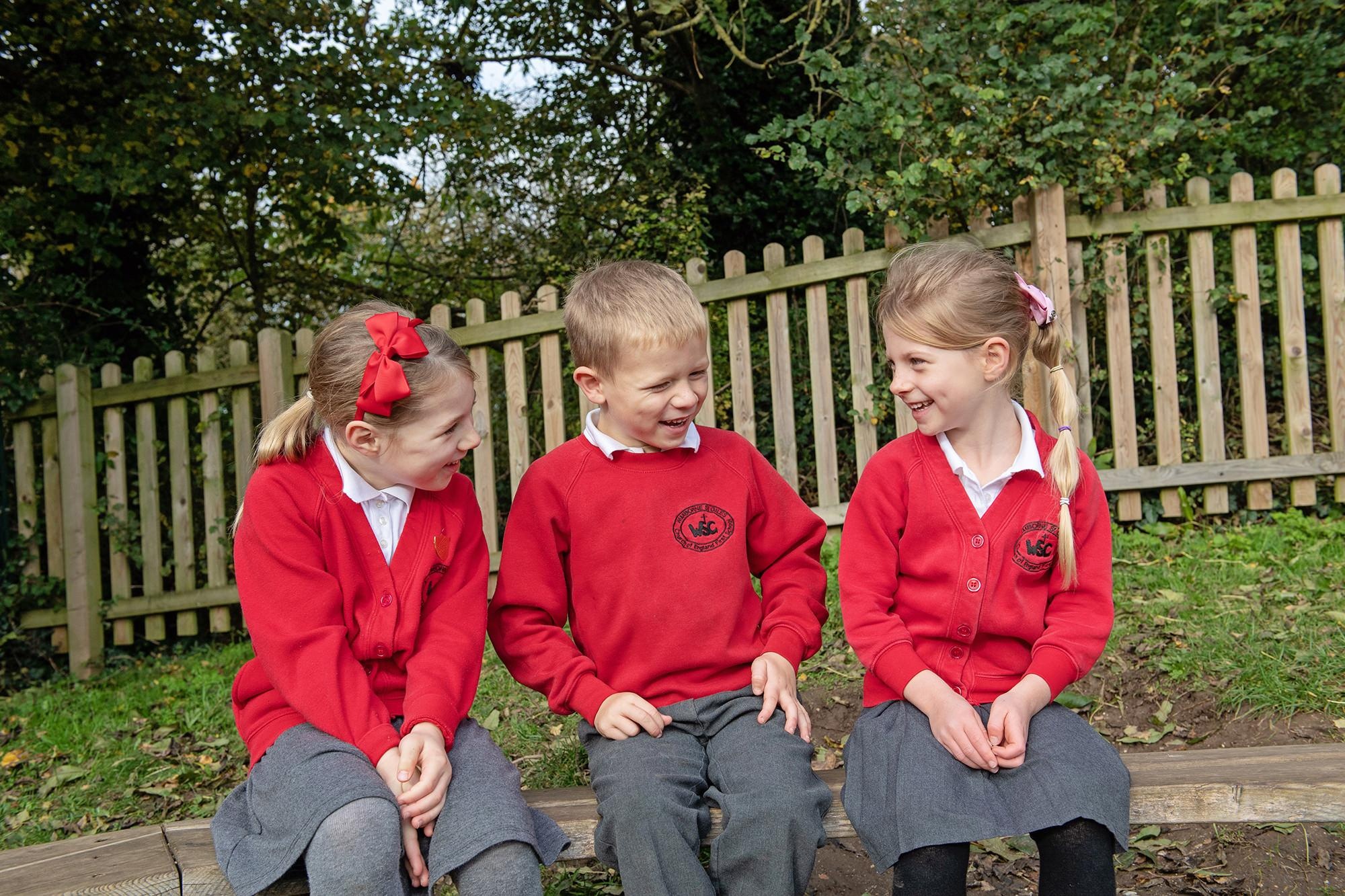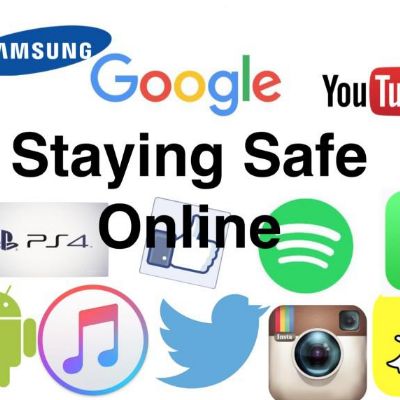Safeguarding
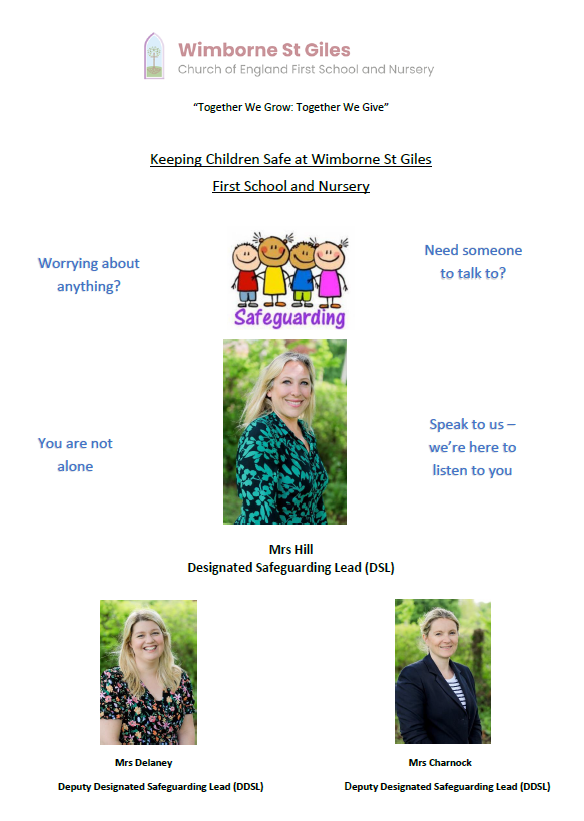
This information aims to help parents understand the process of protecting children and keeping them safe and the procedures which we, as a school, have to follow.
At Wimborne St Giles CE First School and Nursery, children’s welfare is of paramount importance. We are committed to working with parents to ensure that our pupils have a happy, safe and positive learning environment both at school and at home.
As a school, we are committed to and have a legal duty to safeguard your child’s welfare. All members of staff in school are trained in safeguarding children and are committed to ensuring the safety of all our pupils.
If the school is worried about a pupil’s welfare and that a child is at risk of harm, we must legally look into the matter and follow:
1. The law
2. Guidance from the Department for Education
3. Local multi-agency child protection procedures
The Pan-Dorset Safeguarding Children Partnership
In line with the requirements set out in Chapter 3 of ‘Working Together’ (2018) , on 1st August 2019 the two Local Safeguarding Children Boards ceased to exist, and a new Pan-Dorset Safeguarding Children Partnership took over statutory responsibility for leadership and multi-agency co-ordination of “arrangements to work together to safeguard and promote the welfare of children.”
Accountability for the Pan-Dorset Safeguarding Children Partnership rests with Dorset Police, Dorset CCG, Bournemouth, Christchurch & Poole Council and Dorset Council with a “shared and equal duty” to engage with all other “relevant agencies” working with children and young people to ensure a coherent approach to the wider, local safeguarding system.
Keeping Children Safe In Education
The Department for Education (DfE) has published an updated version of the statutory safeguarding and child protection guidance for schools in England, Keeping children safe in education (KCSIE) (DfE, 2025). This guidance has replaced KCSIE 2024 and came in to force on 1 September 2024. The guidance sets out what schools and colleges in England must do to safeguard and promote the welfare of children and young people under the age of 18.
Anti Bullying
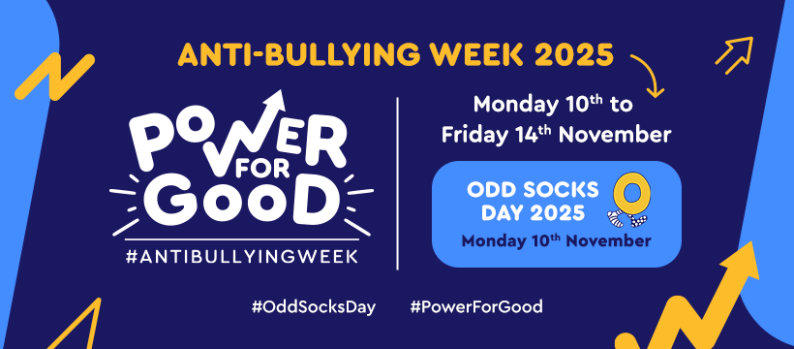
Every year, we take part in Anti-Bullying week. Anti-Bullying Week 2025 is coordinated in England and Wales by the Anti-Bullying Alliance and will take place from Monday 10th - Friday 14th November, with the theme: Power for Good. The week will kick off with Odd Socks Day on Monday 10th, with adults and children being encouraged to wear odd socks to celebrate what makes us all unique.
The theme of Power for Good has come about following consultation with teachers and pupils by the Anti-Bullying Alliance which coordinates Anti-Bullying Week every year in England, Wales and Northern Ireland. Teachers and children wanted a theme that empowered them to do something positive to counter the harm and hurt that bullying causes.
Following the success of the campaign in 2024 – when over 80% of schools marked the week, reaching over 7.5 million children and young people – this year, we’ll empower children and young people to use their Power for Good to speak out, support others, and build a world where kindness wins.
To watch the official 2025 Anti-Bullying primary school film, click here.
Domestic Abuse
Domestic violence and abuse has been recognised nationally as having a significant impact on both individuals and families. It is a common misconception that children witness rather than experience domestic abuse. The definition of abuse now highlights that children are also victims and survivors (Home Office 2020) and, therefore, understanding impact is key.
Research evidence shows that children experiencing domestic violence and abuse can be negatively affected in every aspect of their functioning, safety, physical and mental health and well- being, school attendance and achievement, economic wellbeing and emotional development. The effects may continue into adulthood affecting their ability to form peer friendships and healthy partner relationships of their own. In the most extreme cases, children are at risk of serious injury or death as a result of domestic violence and abuse. For many children experience of living with domestic violence and abuse is the underlying factor in other needs for which they come to the notice of services and individual organisations.
For support for families who may be experiencing domestic abuse, please click here.
Private Fostering
What Is ‘Private Fostering’?
Private fostering is when a child under the age of 16 (under 18 if they are disabled) is cared for by someone who is not their parent or a ‘close relative’. This is a private arrangement made between a parent and a carer for 28 days or more. Close relatives are defined as step-parents, grandparents, brothers, sisters, uncles or aunts (whether of full blood, half blood or marriage).
There are a variety of reasons why a parent may be unable to care for their own child on a short or long term basis and a private fostering arrangement can be a positive response from friends and the local community to a family in need of support. However, any child separated from their parents is potentially vulnerable and we all have responsibilities to ensure the alternative care they receive meets their welfare and safety needs.
To help us keep children safe and support families, all parents and private foster carers must notify their Local Council. If not, they miss out on essential welfare checks for the children, plus other support services.
These include:
- Advice on claiming benefits and possible funding for some essential items
- Parenting support and advice
- Help in bringing families in crisis back together
- Here are some typical examples of private fostering arrangements
- Children sent to this country, for education or health care, by parents who live overseas
- A teenager living with a friend’s family because they don’t get on with their own family or due to other family circumstances
- Children living with a friend’s family because their parents’ study or work involves unsociable hours, which make it difficult to use ordinary day care or after-school care
- Children staying with another family because of a family crisis such as parents’ ill health or parent’s separation
- A child from overseas staying with a host family while attending a language school
- Students at boarding school who stay with a host family during holidays
- Forces families where children stay with another family while their parents are deployed
Are you caring for someone else’s child?
If you are caring for a child on a full time basis and you are not the child’s parent or close relative you may be viewed as a private foster carer.
Is your child living with someone else?
If your child is living with someone else on a full time basis and is not living with a relative or someone who has parental responsibility, he or she may be considered to be privately fostered.
What to do?
The law states that carers and parents must notify the Local Council’s Children’s Services of any private fostering before the arrangement begins. If the arrangement has already begun, then you must notify them immediately.
What will happen?
You will then be contacted by a social worker who will visit and discuss the arrangements with you, make sure the child is safe, healthy and happy, and offer support and advice.
If you know of a child being privately fostered please don’t ignore it. Speak to the child’s carer or contact:
If living in Dorset contact the Children’s Advice & Duty Service on 01305 228558
If living in Bournemouth, Christchurch or Poole contact the Private Fostering Team on 01202 454932, or by sending an email to private.fostering@bcpcouncil.gov.uk .
Helpful resources:
The British Association for Adoption and Fostering
Bournemouth, Christchurch & Poole – Private Fostering
Dorset Council – Friends and Family Care
Dorset Council – Private Fostering
Dorset Council – Private Fostering Factsheet
Operation Encompass
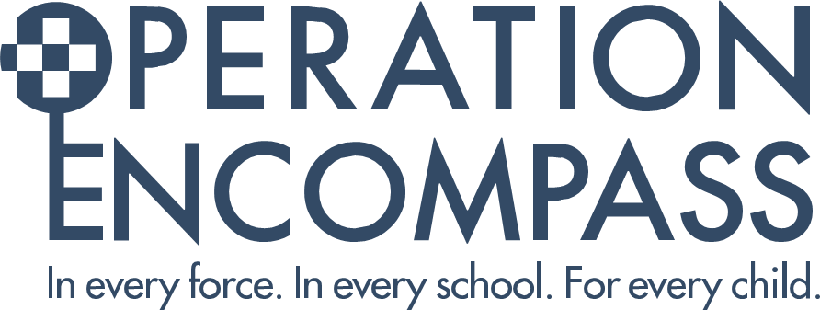
Operation Encompass is a national operation that directly connects the Police with schools and early years settings to secure better outcomes for children who are subject or witness to police-attended incidents of domestic abuse. Provision of support within the school/early years environment means children are better safeguarded against the short-, medium- and long-term effects of domestic abuse.
To find out more about Operation Encompass click here.
OUR KEY ADULTS ARE: Mrs Philippa Hill
Operation Encompass Safeguarding Statement
Our school is part of Operation Encompass. This is a police and education early intervention safeguarding partnership which supports children and young people who experience Domestic Abuse.
Operation Encompass means that the police will share information about Domestic Abuse incidents with our school soon after they have been called to a domestic incident.
All Key Adults (DSL/DDSL) have attended an Operation Encompass local briefing as well as national online training.
Our parents are fully aware that we are an Operation Encompass school.
The Operation Encompass information is stored in line with all other confidential safeguarding and child protection information.
The Key Adult has also led briefings for all school staff and Governors about Operation Encompass, the prevalence of Domestic Abuse and the impact of this abuse on children. We have also discussed how we can support our children following the Operation Encompass notification.
The Safeguarding Governor will report on Operation Encompass in the termly report to Governors. All information is anonymised for these reports.
The Key Adult has used the Operation Encompass Toolkit to ensure that all appropriate actions have been taken by the school.
E-safety
E-safety can also be called ‘internet safety’, ‘online safety’ or ‘web safety’. E-safety is often defined as 'the safe and responsible use of technology'. This includes the use of the internet and also other means of communication using electronic media (eg text messages, gaming devices, email etc). At Wimborne St Giles CE First School and Nursery, our aims are:
- to protect and educate pupils and staff in their use of technology
- to have the appropriate mechanisms to intervene and support any incident where appropriate
We educate the children about e-safety through the Computing curriculum, Relationships and Sex Education, and our wider Curriculum, participation in Safer Internet Day and Anti-Bullying Week and by linking work to our values of Love, Hope and Joy.
Click below for useful links for children and parents. (Please check these links and content beforehand to ensure they are suitable for the age of your child).
There are also links on the Children's pages.
E-Cadets
-
ThinkUKnow Guide to internet safety and safe surfing for young people from Think U Know. Learn about online safety when using blogs, chatting, online gaming, P2P and more.
-
Think U Know 5-7 years old Think You Know has created a website for children aged 5-7 help you go on the internet in a safe way and know who to talk to if you are worried.
-
NSPCC Online safety Helpful advice and tools you can use to help keep your child safe whenever and wherever they go online.
-
BBC Own It Welcome to Own It! We are here to help kids boss their online lives. Whatever you need – help and advice, skills or inspiration – we have it covered.
-
Childnet Lots of online resources for parents and children to help stay safe on-line.
-
The Safe Schools and Communities website Click here for a link to the Safe Schools and Communities website.
E-Safety Newsletters
We are an eCadet school!
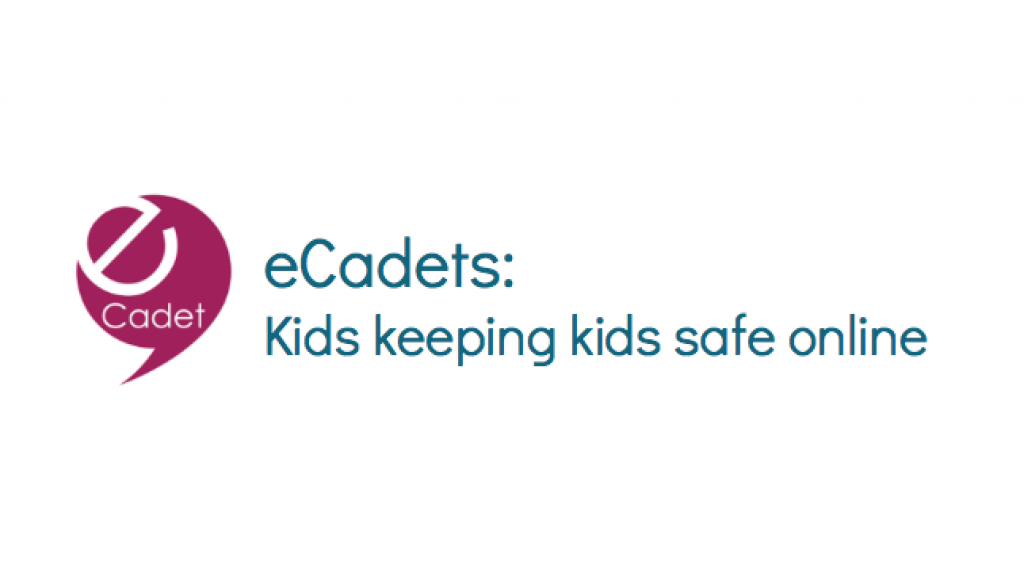
We’re proud to announce we’ve become an eCadet school! The eCadets is an award winning programme which trains, empowers and supports a team of pupils to keep their friends safe online. Through our E-cadets we are now able to deliver an age-appropriate e-safety curriculum that is flexible, relevant and engages pupils’ interest; that is used to promote e-safety through teaching pupils how to stay safe, how to protect themselves from harm and how to take responsibility for their own and others’ safety.
Throughout the programme children can complete fun challenges and earn points for our league table!
This week we will be holding elections for our E-cadets and they will then start training and delivering E-safety sessions and activities across the school. Visit the website https://www.ecadet.zone/ for more information.

